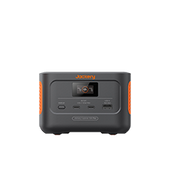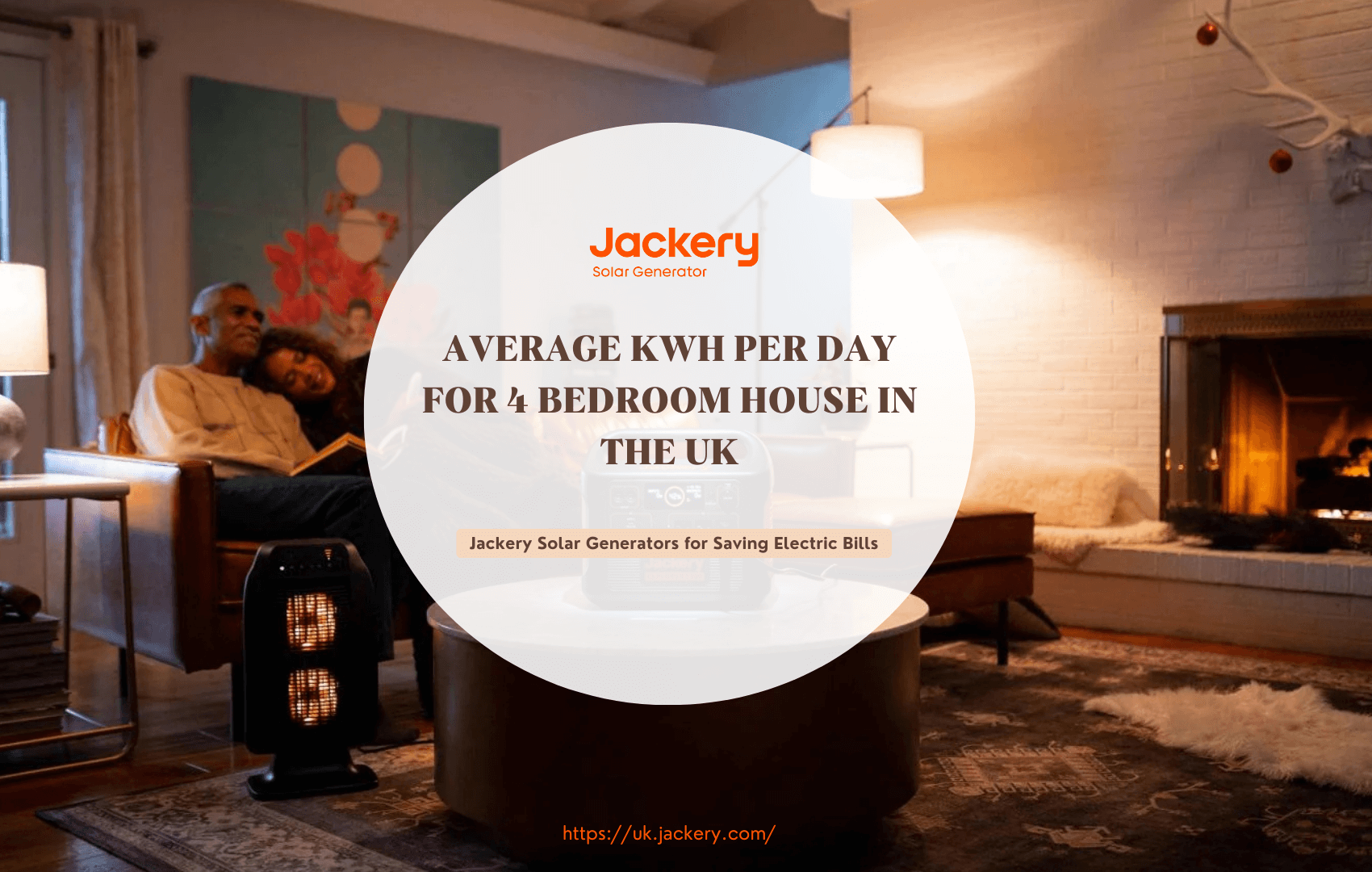Generally, the larger the area or the more bedrooms a house has, the more electricity it consumes. The average annual electricity usage of a medium house with 3 or 4 bedrooms is 2,900kWh.
Electricity consumption is an essential factor in assessing energy usage in UK households. People have recently begun to pay attention to improving energy efficiency and reducing household electricity consumption.
To save electricity for a four-bedroom house in the UK, you first need to understand its average electricity usage. In addition, this article also reveals the factors that affect the kWh per day of a four-bedroom house in the UK and how to improve it. Moreover, we highly recommend the Jackery Solar Generator, which is portable, powerful, and safe to use at home to save electric bills.
|
Key Takeaways: |
|
According to government data, the UK used 262.9TWh of electricity in 2023, of which only about 30% (92.3TWh) was used for household electricity. A four-bedroom house's average annual electricity consumption is assumed to be between medium (2900kWh) and high (4300kWh), so the specific data is 3,500 kWh. Based on the average annual electricity consumption (3,500 kWh), the average daily electricity consumption of a 4-bedroom house in the UK is about 9.5 kWh. We highly recommend Jackery Solar Generator 2000 Plus or 1000 v2 to save your electric bills with solar energy. |
Does The UK Consume A Lot of Electricity?
According to government data, the UK used 262.9TWh of electricity in 2023, of which only about 30% (92.3TWh) was used for household electricity, the lowest level since 1989 and 3% less than in 2022. Since the peak of electricity consumption in 2005, the UK has reduced it by 26%. Of course, this decline is caused by rising temperatures, rising energy prices and more energy-saving devices.
According to current trends, the UK's electricity demand is increasing. In 2021, the British government passed a law forcing the country to reduce carbon emissions by 78% from 1990 to 2035. As the UK gradually achieves net zero carbon emissions, its electricity consumption will increase rapidly in the coming decades, simultaneously pushing electricity costs.
On the one hand, heat pumps will soon be popular in homes and commercial buildings in the UK. Since receiving a £7,500 heat pump grant from the Boiler Upgrade Scheme, heat pump sales have risen steadily yearly.
On the other hand, the number of electric vehicles in the UK is also growing. Homes and businesses in the UK are turning to electric cars, and the government continues to promote them through subsidies and incentives.
As a result, as the UK becomes more reliant on electricity to power its heating and transport systems, demand for electricity will increase.
Average kWh Per Day for 4 Bedroom House in The UK
One critical factor influencing electricity consumption in the UK is the size of the house. Generally speaking, larger houses usually require more electricity. Of course, many people assume that larger houses or houses with more bedrooms use more electricity.
The size of the house or the number of bedrooms significantly impacts electricity consumption because larger houses or houses with more bedrooms (and usually more people) have more lights and appliances, which leads to higher electricity consumption.
Average Daily kWh of Different House Sizes
In the UK, house size is usually defined by the number of bedrooms. Of course, the electricity consumption varies greatly depending on the number of bedrooms (house size).
So, as a homeowner in the UK, you may want to know how your electricity consumption compares to the national average. Here is some information about the average daily electricity consumption of different house sizes in the UK:

Small House (1 to 2 Bedrooms)
A tiny house is usually a house or apartment with one or two bedrooms. Its electricity usage is characterised by occasional heating use, weekly washing machine use, and usually no dishwashers or tumble dryers. In addition, family members stay home for a short time and use electrical appliances less frequently.
In summary, the average annual electricity usage of a small house with one or two bedrooms is 1,800kWh. Based on 365 days per year, a small house's average daily electricity usage (1 to 2 bedrooms) is 4.93kWh.
Medium House (3 to 4 Bedrooms)
Medium houses usually have three or four bedrooms. They are generally inhabited by three to four people who are less likely to be at home during the day, so electricity is usually used frequently at night.
In addition, the electricity usage of a medium house is characterised by using high-energy-consuming appliances such as washing machines, dishwashers, and heating several times a week.
Generally, the average annual electricity usage of a medium house with 3 or 4 bedrooms is 2,900kWh. Based on a 365-day year, the average daily electricity usage for a medium-sized house (3 to 4 bedrooms) is 7.94 kWh.
Large Houses (5 or More Bedrooms)
Large houses usually have five or more bedrooms and are generally inhabited by four to five people. Compared to a small house, a 5-bedroom house has significantly more lighting, appliances, and electronic equipment, so the electricity usage is higher.
Moreover, large houses use washing machines almost daily and often use high-energy appliances such as heaters, dishwashers, and tumble dryers. Large homes with hot tubs or swimming pools may consume more electricity. For example, using a hot tub once a week may add 300 kWh of electricity per year.
It is estimated that large houses with five or more bedrooms usually use an average of 4,300 kWh of electricity per year. Based on a 365-day year, the average daily electricity usage for large houses (5 or more bedrooms) is 11.78 kWh.
|
Energy Use |
Low |
Medium |
High |
|
House Size |
Small house (1 to 2 bedrooms) |
Medium house (3 to 4 bedrooms) |
Large house (5 or more bedrooms) |
|
Average Daily Electricity Usage |
4.93kWh |
7.94kWh |
11.78kWh |
|
Average Annual Electricity Usage |
1,800kWh |
2,900kWh |
4,300kWh |
(Data Source: Ofgem)
The above electricity consumption estimates for houses of different sizes include general electricity use such as lighting, running appliances, charging devices, etc.
However, their electricity usage will depend on various factors, such as the number of appliances used, energy consumption habits, and energy conservation measures. In addition, knowing the average electricity consumption can provide a benchmark to evaluate electricity usage and promote measures to reduce electricity consumption.
Average Daily kWh for A 4-Bedroom House in The UK
In the UK, many people wonder how much electricity a four-bedroom house consumes. A four-bedroom house's average annual electricity consumption is assumed to be between medium (2900kWh) and high (4300kWh), so the specific data is 3,500 kWh.
Based on the average annual electricity consumption (3,500 kWh), the average daily electricity consumption of a 4-bedroom house in the UK is about 9.5 kWh.
However, it is worth noting that depending on electricity usage habits, the specific electricity consumption may be higher or lower than the average electricity consumption estimated by Ofgem.
If you stay at home for a long time (frequent use of appliances, etc.), then this will mean that the electricity consumption will be much higher. In addition, if everyone has different sleep schedules, this will increase consumption because appliances are used more frequently.
What Factors Affect kWh A House Use?
In addition to the size of your home, various factors affect your home's electricity usage, such as home size, weather conditions, and electricity usage habits.

Understanding the factors that affect your home's electricity usage can help you manage your electricity consumption more effectively and develop better electricity usage habits. Here are a few of the main factors that affect your home's electricity usage:
- Household Size
Household size, or the number of people living in your home, can significantly affect your home's electricity usage. Regardless of the size of your home, a single person's electricity bill may be lower. However, if the family has five people, electricity usage tends to be higher. Because more people are in the home, the amount of cooking, washing, and hot water used can significantly affect electricity usage.
- Weather &Climate
The number of kilowatt-hours a home uses can vary depending on factors you cannot control, such as weather conditions. During the heat waves in the summer or severe cold in the winter, the heating or cooling system is often used more frequently, increasing kilowatt-hour consumption.
Furthermore, the quality of the insulation in the house dramatically affects the electricity consumption required to maintain the desired temperature. For example, a well-insulated home will retain heat more effectively during cold months, reducing the need for excessive heating.
- Appliance Types &Energy Efficiency
The types of appliances you use in your home have a significant impact on your electricity consumption. Your home will use more electricity if you frequently use energy-hungry appliances like ovens, clothes dryers, and air conditioners.
The energy efficiency of your appliances can significantly affect your home's electricity usage. For example, older appliances are often less energy efficient, which can lead to increased electricity usage. On the other hand, energy-efficient appliances use less electricity than older, less efficient ones. So upgrading your home's commonly used appliances to energy-efficient ones can save a lot of electricity.
- Lifestyle Habits
Lifestyle habits significantly impact electricity usage. In other words, how you use your appliances and when they are most active can substantially affect electricity consumption. For example, if you leave your lights on 24 hours a day or leave your TV on all night, your kWh usage will be high.
What Appliances Use the Most Electricity in The UK?
With the cost of living soaring in the UK, many people are concerned about their electricity consumption and bills. However, many people need to be made aware of which appliances are costing them the most. Here is a list of the appliances that use the most electricity in their homes.

- Tumble Dryer: It is no surprise that tumble dryers are our homes' energy-intensive appliances. On average, they use 52.25 kWh of electricity per month, making them the main culprits for high household electricity consumption.
- Dishwasher: In the UK, dishwashers use an average of 40 kWh of electricity per month. To reduce dishwasher power consumption and running costs, many try to ensure they only use them once daily. (Many people choose to use the dishwasher at night when electricity costs are lower)
- Fridge: The refrigerator is also an essential home appliance that cannot be ignored. It uses an average of 35.42 kWh of electricity per month.
- Washing Machine: Washing machines also account for most household electricity consumption, consuming an average of 35 kWh monthly. However, a washing machine's electricity consumption depends on its efficiency rating and how often it is used.
- Oven: The oven also accounts for much of the electricity consumption. The average oven uses 24.16 kWh per month. The more efficient convection oven many choose can usually save about 20% on the original electricity consumption.
- Computer: Potent gaming computers can significantly increase electricity consumption. In a UK household, a laptop uses about 14.16 kWh per month. In addition, if the computer is left in standby mode for a long time, it will consume a lot of electricity.
- Electric Kettle: While many new and efficient electric kettles are on the market, many people still need to use old and efficient ones. The old electric kettle uses an average of 13.75 kWh per month.
How To Reduce Your kWh Usage?
Now that you know the average electricity usage and which appliances use the most energy, it's vital to understand how to save electricity. Many people wonder how to reduce electricity usage at home. Here are some practical ways to reduce electricity usage:

Turn Off Appliances in Standby Mode
Most appliances can be turned off directly after use rather than left in standby mode. Simply turning off your appliances' standby mode can save you a lot of electricity yearly. In addition, items such as smart plugs or standby savers allow you to turn off the standby function of all your appliances at the same time.
Choose Appliances with High Energy Efficiency Ratings
In addition, the parameters of home appliances and electronic products are also essential factors that affect electricity consumption. Usually, washing machines with lower load capacity can help you reduce electricity consumption.
Energy-saving Lighting
Energy-saving lighting usually means replacing traditional light bulbs with modern LED lighting, as conventional light bulbs consume a lot of electricity. LED bulbs use less electricity and will help you save a lot of electricity, so it is worth investing in.
Besides, you can also choose intelligent lighting control systems to program the lighting to come on at specific times. Of course, if possible, try to make the most of natural light during the day to reduce the need for additional lighting.
Optimise Your Heating System
No matter your heating method, using a unique regulator to control the heating system is a good idea. Particular regulators for heating systems can program the heating according to a schedule so that it starts when the room temperature drops below a certain level and optimises electricity consumption. In addition, temperature sensors can be installed in various rooms to monitor the conditions in each room and adjust the temperature according to the situation.
Renewable Energy
Almost everyone wants to get involved in saving energy. An excellent way to do so effectively is to use renewable energy. Nowadays, many people use solar energy systems to save energy because solar power is economical and ecologically friendly.
Solar generators, like Jackery Solar Generators, give your home a renewable way to reduce dependence on the power grid. Investing in a good solar generator ensures you can harvest and store enough solar energy to reduce electricity consumption significantly.
Jackery Solar Generators for Saving kWh Usage
You can save electricity at home or while outdoors in several ways. In addition to being aware of energy-saving practices, choosing a solar generator to charge essential appliances effectively reduces electric bills.
Jackery Solar Generators are comprised of SolarSaga Solar Panels for solar energy capture and Explorer Portable Power Stations for energy storage for further utilisation. The generator can power multiple appliances, such as refrigerators, TVs, lights, etc. Here, we recommend Jackery Solar Generator 2000 Plus and 1000 v2.
Jackery Solar Generator 2000 Plus
Jackery has introduced the Solar Generator 2000 Plus, a solid portable power solution that delivers outstanding performance. With its impressive capacity and powerful output, this device can support the operation of typical household appliances for weeks, which is best for saving kWh usage in your house.
- Expandable Powerhouse for Your Appliances: The Jackery Solar Generator 2000 Plus enables the addition of extra battery packs, increasing the capacity from 2 kWhto an impressive 12 kWh, thereby significantly improving the solar charging capabilities. This solar product has a remarkable output of 3000W, providing a 30% higher rated power than other 2 kWh solar products. Almost all necessary household appliances are powered.
- Higher Resistance & Reliability: The Explorer 2000 Plus stands out as a groundbreaking add-on battery pack that offers the convenience of recharging through solar panels. This feature increases versatility, boosts charging efficiency, and shortens charging time.
- Safe to Use with ChargeShield: ChargeShield is Jackery's advanced fast charge technology, featuring 62protective mechanisms, 12 protective algorithms, and four types of physical safety protection. This technology uses a unique stepped variable-speed charging algorithm to enhance safety and extend battery pack lifespan by 50%.

|
*Review from Our User |
|
I purchased this after relying on a car's power output for a video field production during a prolonged power outage, ensuring I had a dependable solution to keep everything running smoothly for an extended period. This Solar Generator 2000 Plus is expected to power my 5-camera setup for approximately six hours, which should be sufficient for any practical emergency. |
Jackery Solar Generator 1000 v2
Jackery Solar Generator 1000 v2 is the smallest and lightest 1 kWh solar generator for home or outdoor uses, which pairs the Explorer 1000 v2 portable power station with SolarSaga 100W solar panels. Compared to Solar Generator 2000 Plus, it is more suitable for charging essential electronics or devices.
- Charging Several Appliances in Emergencies: The Explorer 1000 v2 portable power station provides a phenomenal 1500W output, 50% more than prior editions, to efficiently run high-demand needs, including refrigerators, ovens, portable air conditioners, etc. With USB-A/C connections and up to 100W dual PD charging, it can charge several devices (phone, laptop) concurrently, therefore serving as the best friend for all your power requirements.
- Multiple Recharging Options: The Emergency Charge Mode lets the Explorer 1000 v2 Portable Power Station be wholly charged in less than an hour, providing vital power backup when your battery runs low. If you want to recharge it, it will take 5 hoursfor wall charging or 12 hours for the car charging. Besides, a SolarSaga 100W solar panel will take 15 hours to recharge fully.
- Higher Solar Conversion Rate: The Jackery SolarSaga 100W Solar Panel boasts a solar conversion rate of up to 25%; it is optimally designed for outdoor use and unforeseen power interruptions. The solar panel weighs about 8 lbs, is lightweight, foldable, and equipped with a convenient carry handle, enhancing its portability.

|
*Review from Our User |
|
I had low expectations when I made this purchase. I expected it to perform a few fundamental tasks for a limited duration. I was truly impressed! I purchased this for situations involving power outages. This Solar Generator 1000 v2 is exceptionally well crafted! Efficient and adaptable. I tested it on our side-by-side refrigerator. |
kWh Per Day for 4-Bedroom House FAQs
The following are the frequently asked questions about the average kWh per day for a 4-bedroom house in the UK:
- Is 10 kWh per day a lot in the UK?
The day of the week and time of year both have an impact. Electricity consumption averages between 8kWh and 10kWh per day, while petrol consumption ranges from 33kWh to 38kWh daily.
- Is 40 kWh a day a high consumption for a home?
On average, a home that consumes 40 kWh a day is considered high energy. However, actual electricity consumption depends on factors such as the size of the house and the number of people using it.
For example, the average daily energy use is 40 kWh for a home with an area of 4,000 square feet or six people. Each additional person in the house means more electricity consumption for items such as laundry, hot water, lighting, and keeping the room warm.
- What is the average kWh consumption per household in the UK?
The typical kilowatt-hours (kWh) consumed by a household in the UK varies based on the energy type and household size. The typical household in the UK consumes 8 kWh of electricity daily, totalling 2,700 kWh annually. A typical household consumes about 2,900 kWh annually.
- Is knowing about kilowatt-hours helpful in reducing electricity consumption?
Kilowatt-hours (kWh) represent the electricity a device consumes in one hour. Calculating the total household electricity consumption in kWh requires adding the kWh measurements of all energy-consuming devices.
For example, how to calculate the kWh usage of a microwave oven (2000W):
You just need to multiply the wattage by the hours you use the microwave oven per day (e.g., 1 hour) and divide the result by 1,000 to get its kWh. 2000W*1h/1000=2kWh.
Finally, multiply the microwave oven's kWh by the days you want to measure (e.g., about 20 days per year). Therefore, a microwave oven that consumes 2 kWh will consume about 40 kWh per month and 480 kWh per year.
Knowing about kWh is very useful for understanding the electricity consumption of a specific appliance, which can also help you plan to save electricity.
Final Thoughts
Electricity consumption is a hot topic in the UK, as many people want to know the average electricity consumption of a typical household and a four-bedroom house in the UK. In summary, this article provides relevant electricity consumption data for owners of four-bedroom houses in the UK (including electricity consumption data for homes of different sizes in the UK). Besides, this article provides some effective measures for owners to reduce electricity consumption.





































































































